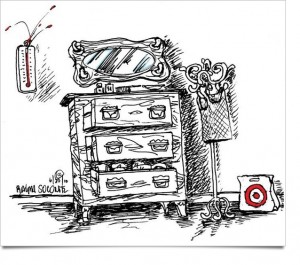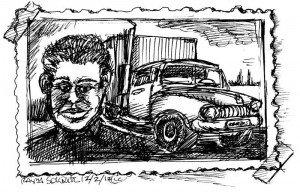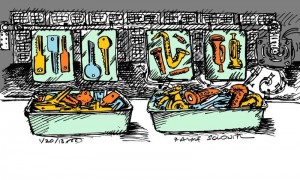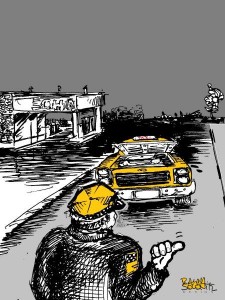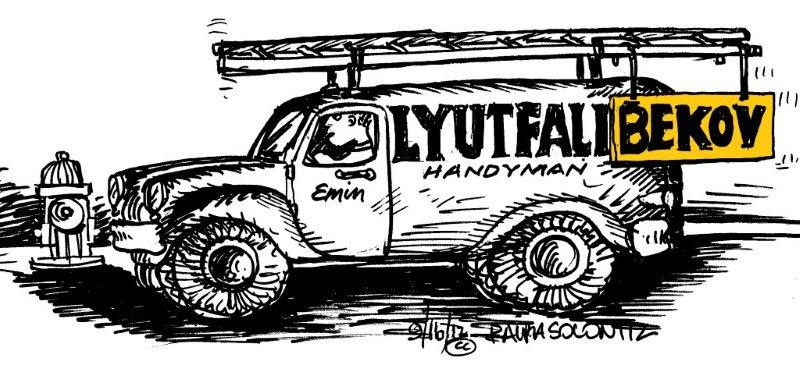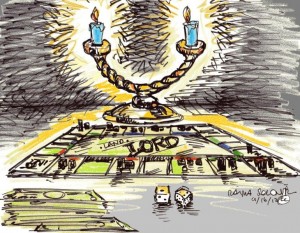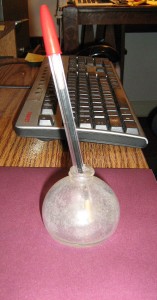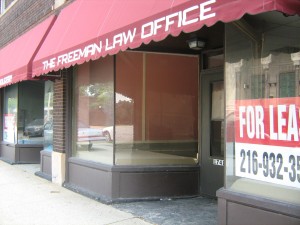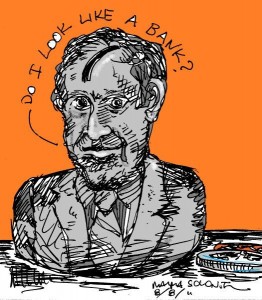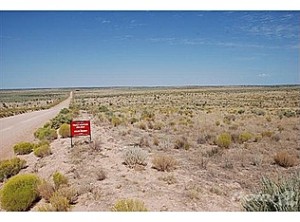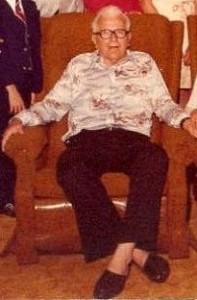Category — Toby
NEVER ON FRIDAY AFTERNOON
I had two hot water tanks go out in the same building on the same day, a Friday afternoon.
Four guys can carry in a 92-gallon commercial hot water tank . And I can pay $5,400 for their fun.
No plumbers were around. They were all preparing their boats for Lake Erie weekend-cruising.
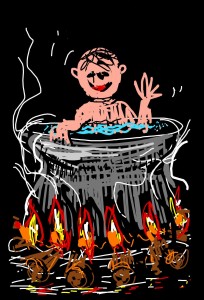 I reached Stack Heating. Stack said he didn’t do commercial hot-water tanks. Just boilers. I reached Royal Flush. They said they couldn’t get it until Tuesday. Dale at Madison Plumbing could do it Monday. Pompeii said never. B & B Hot Water Tank said no thanks.
I reached Stack Heating. Stack said he didn’t do commercial hot-water tanks. Just boilers. I reached Royal Flush. They said they couldn’t get it until Tuesday. Dale at Madison Plumbing could do it Monday. Pompeii said never. B & B Hot Water Tank said no thanks.
I started flipping through the Yellow Pages. That is the end of the world.
I braced myself for calls, like “Mr. Landlord, there is no hot water. How am I supposed to go to work without showering? ” . . . “I have to stay at my parents’ house and it’s 60 miles from work . . . ”
It’s not pleasant, these scenes.
I got Bill the plumber. He came by and blow-torched the old tanks to dry them. (The tanks had flooded because a sump pump had failed.) The plumber gave the first tank a 50-50 chance of recovery. The second tank had 40 percent chance, he said. I liked his odds.
The first tank went on after six hours of pampering. We were good.
Still, it was no picnic.
. . . Dear Landlord, I have deducted $275 from my rent payment because I stayed in a hotel for three days due to the lack of hot water.
Didn’t happen!
—
SIDE B
In honor of the mildest summer ever . . .
WICKIN’ COOL
I threw out my dad’s wife-beater T-shirts. About time. My father died 27 years ago. The wife-beaters were balled up in my dresser drawer.
When it’s 90-plus degrees — which it isn’t often this summer — I think “wife-beaters.” I used to wear my dad’s wife-beaters around the house.
My wife bought me a wicking T-shirt with UV protection at Target. Only $11. It was cooler than the wife-beater.
I saved one of my father’s T-shirts for posterity and threw the rest out.
Underwear fashion is generational. My grown sons aren’t interested in my wife-beaters. My dad wore his wife-beaters under dress shirts for work, for his day job at the key company.
I’m going to buy a couple more ultra-light wicking T-shirts.
No doubt, my sons will pitch my ultra-lights when I’m either dead or not looking. By 2025, T-shirts will be spray-on from a can.
Meanwhile, I’m wickin’ cool.
—
A version of “Wickin’ Cool” was on CoolCleveland.com 7/12/12.
August 28, 2013 2 Comments
TRUCKIN’
My cousin David owned a GMC tractor-trailer, which he parked in the May Co. lot in University Heights. David may have been the only Jewish long-distance trucker in the Heights. Maybe the only long-distance trucker, period, in the Heights.
In 1975 David borrowed several thousand dollars from my father, Toby, for the truck. David had a contract with International Truck of Rock, Minnesota.
David moved to Pennsylvania and never repaid my dad.
In high school David had stolen hubcaps. He had been a Shaker Heights juvenile delinquent.
David even looked like James Dean. My cousin Danny once said, “David’s dad was the most handsome man you ever met.” David’s dad drifted around Cleveland, playing pool. David’s dad and mother divorced in the 1950s.
When David’s mother heard David hadn’t repaid my dad, she made payments, but she never fully repaid the loan.
My father’s attitude was “win some, lose some.” Toby believed in lending money to family. My dad had borrowed from his Uncle Itchy to buy his first house.
Last year I called David’s sister. This was a big deal; David and his sister were out of the cousins’ loop. David is now in his seventies and has had several heart attacks, his sister said. He is living in a hotel that his son runs in Florida.
No more truckin’.
No more David as family black sheep. Stolen hubcaps and an unpaid loan, is that the worst of it in my family? I think so.
Now, my wife has an estranged cousin who stole sterling silver . . . Stop.
—
“David” is a pseudonym.
—
SIDE B
FITBIT
I became bionic. My daughter, Lucy, gave me a pedometer.
I can count my daily steps. I can even monitor my sleep patterns, but that’s too much data — even for a guy like me who likes data.
 Brisk walking. If you do it, ipso facto, you’re a dork.
Brisk walking. If you do it, ipso facto, you’re a dork.
I gave up jogging last year. My right knee wasn’t into it anymore. I miss the “sweat” of jogging.
I walk.
Should I post my step count here? Dieters post their calories online. Bicyclists post their heart rates.
My step count today is _____. (Will post up at 11:59 p.m for maximum effect.)
Your count?
—
For a couple new illustrations by Ralph Solonitz, please scroll down to “KlezKamp 2012,” which went up last week.
—
Yiddishe Cup plays at First Night Akron on New Year’s Eve.
December 26, 2012 1 Comment
THE REAL WORLD (PARTS I and II)
PART I
I worked at a key warehouse as big as Home Depot. But just keys. The warehouse supervisor drove a golf cart.
I packed car keys. This was a summer job.
My dad worked in the front office.
My shift was about seven hours too long. I rested on my cart for massive breaks. Sarge, the warehouse supervisor, threatened to fire me, but he had a problem — my dad (aka the front office).
I told my father I wanted out of the job; I didn’t want any more money; I didn’t want a car; I didn’t want a UAW card. I had several thousand dollars from my bar mitzvah money. Let me go. I could be in Barcelona in a minute.
But I was stuck in the warehouse. Big presses stamped out car keys. Kaboom.
A band instrument factory was right next door. Why couldn’t my dad work there? King Musical Instruments. King had an employee who stood at the end of the assembly line and blew saxes all day.
Next time around, work at King, Dad.
PART II
The taxicab supervisor, smoking a stogie, asked, “Where’s Charity Hospital?”
“I don’t know, ” I said.
“Where’s the Federal Building?”
“Ninth Street.”
“The Pick-Carter Hotel?”
“I don’t know.”
“The Hollenden House?”
“Downtown — St. Clair.”
“People want to know where their hotel is,” he said.
Fair enough.
But hired me. Yellow Cab.
I drove welfare recipients with vouchers to hospitals, and workers to Republic Steel Works #4. I didn’t drive many rich people; I thought I was going to drive rich people, but it was poor people.
I picked up a fare downtown. The customer said, “Severance Hall.”
“Are you Claudio Abbado?” I asked.
“How do you know!” he said.
I knew because I had seen hi’s picture in the morning paper.
I stopped at my neighbor, John, afterward, and told him I had just driven a famous person. I said, “He’s a conductor from Italy.”
“Why did he come here?” John said. John’s favorite expression was “Cleveland is the armpit of the nation. ” Put that slogan on your cab door. This was 1970.
Taxi driving ultimately didn’t agree with me. A cabbie told me to carry a bat. He said, “A bat isn’t a concealed weapon. It’s legal.”
I had a low batting average.
My cab stalled at Fairmount Circle. The engine smoked. I left the cab and hitched back to the Noble Road garage.
The supervisor said, “You mean you left your cab, son?”
“I knew I could get back here. ”
“You mean you left your cab unattended?”
“Yes.”
December 12, 2012 No Comments
KILLER FLOORING
1.
My dad, Toby, and I hired Charles Tuncle for kitchen-floor lino jobs. Tunkl means dark in Yiddish, which my dad never failed to point out. Tuncle — the man — was black. Also, he was a killer. He shot a man in a bar.

Armstrong no-wax. Tuncle, 1984. (2010 photo)
When Tuncle was sent to prison, my dad wrote the parole board about Tuncle’s quality vinyl-floor work, and Tuncle got out early. My father never told the tenants — or our building managers — about Tuncle’s record. My dad never said: “You see that guy over there with the utility knife? He’s a killer.”
***
My dad called our business Reliable Management Co.
We should have hauled garbage with a name like that.
When I started an offshoot company, Acorn Management Co., my dad said, “What the hell does ‘Acorn’ have to do with anything?”
“Dad, I live on Oak Road. That’s why.” It was 1976. Environmentalism was the next big thing.
“Nobody is going to understand ‘Acorn,’” he said.
I sometimes call my company “Reliable + Acorn Management companies” now. That makes me feel like a Danish architecture firm.
***
I hired Standard Roofing for a roof tear-off. Standard Roofing went under. Too standard?
My electrician is Jack Kuhl, pronounced “Jack Cool.”
I knew Emin Lyutfalibekov, a handyman. I told him to shorten his name, and he said no way; he was offended. He said he was royalty back in Azerbaijan.
Napoli Construction is a bricklaying firm. Art Gallo, chief mason.
I use Donnelly Heating once in a while. Dan Donnelly. There are four Donnelly heating companies on the West Side: Dan, Tom, William and Original. They must have large Seders.
Lawrence Christopher Construction — that was Larry Vesely. He filled a hole for me for $9,000 — a coal bin that had collapsed beneath a parking lot. The city wouldn’t allow me to fill the hole with plain gravel. The city wanted a reconstructed coal bin that could practically double as a bomb shelter, complete with beams and concrete. Larry said the job would cost $3,000 and take several weeks.
The final bill was $9,000 and the job took nine months. One delay and complication after another.
I could not charge higher rents just because I had a nice coal bin. No tenant cared I had a bomb shelter.
I paid Larry back in nine monthly installments, just to get slightly back at him.
***
Tuncle the floor guy — I miss him. He died at 84 in 2008. A nice guy, except for that night in the bar. He didn’t have any other criminal record.
2.
I was at a gathering of Jewish landed gentry — a landlords’ shabbat — in Pepper Pike.
Landlord A — to my right — owned a 17-suiter which her late father had bought in 1955.
Landlord B owned a building his father bought in 1936.
Buy and hold, chaverim. Shabbat shalom.
I owned (with my sister) a building my dad bought in 1965.
In real estate — as in many fields — it’s good to pick the right father.
In college Donald Trump bought his first building, using his father’s money: a 1,200-unit apartment complex in Cincinnati. Trump’s dad owned property in New York’s outer boroughs. Trump’s net worth upon graduating college in 1965 was $1.4 million, in today’s dollars. [Trump, The Art of the Deal.]
Suites, a local real estate mag, did a profile on Marty Cohen, a Cleveland landlord. The article said Marty “couldn’t shake his interest in property management.” Marty worked at a bank for a while, but that wasn’t a good fit. His family owned a 150-unit Parma apartment complex. Maybe that had something to do with Marty finding a good fit in real estate.
Buy and hold, brothers and sisters. Pass the strudel.
3.
Griffith, the state boiler inspector, called.
I said to him, “You’ve been around as long as me!”
“Yes, sir,” he said. “I was around even when your dad was still around! You know, your father was a kinda guy. A good dude. I miss your dad. He was hoping you’d take over the business. And you did!” (My father died in 1986.)
“How long you been around, Griffith?”
“Since 1972. You were just a kid. You were in high school.” (I was in college, Griffith!) “Your dad was a little worried about you, I’ll be honest with you. I hope you don’t take this personally, he thought you didn’t have the fire. You know, he had went through some things that weren’t easy, and he wanted to leave the buildings to somebody who would appreciate them.”
“I gave my father some things to think about, I guess.”
“I’m proud of you. You come around. If he was around, I’d tell him how good you’re doing.”
I didn’t run the family biz totally into the ground.
My epitaph — if I’m lucky: I’m in the Ground But My Business Ain’t.
—
Next week’s post will be on Thursday, not Wednesday, due to Yom Kippur.
—
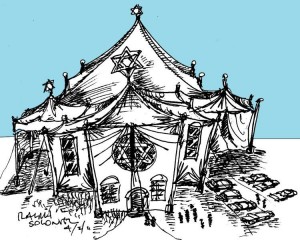 Here’s an op-ed I wrote for the Sunday Cleveland Plain Dealer (9/16/12). “High Holidays beckon twice-a-year worshipers.”
Here’s an op-ed I wrote for the Sunday Cleveland Plain Dealer (9/16/12). “High Holidays beckon twice-a-year worshipers.”
September 19, 2012 6 Comments
GOLF OR TAXES
Every January I spend a day filling out employer tax forms.
My favorite is the Federal Unemployment Tax Act (FUTA) form.
I did my first FUTA Form 940 in 1978, when my dad went to Florida for the winter. He and his high school buddies golfed in Boca Raton, and I filled out FUTAs in Cleveland.
Not bad. I like tax forms better than golf.
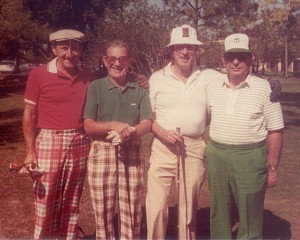
Toby Stratton (far L) w/ friends at Boca Lago CC, 1983
The treasurer of Ohio likes his W-2 reconciliations promptly. The Ohio Bureau of Employment Services also likes its money quickly. The Ohio Workers Compensation bureau has rachmones (pity) and bugs me only twice a year, not quarterly like everybody else.
 I used an IBM Selectric-style typewriter for tax forms until the machine died last year. The A key wouldn’t work. That was its main drawback.
I used an IBM Selectric-style typewriter for tax forms until the machine died last year. The A key wouldn’t work. That was its main drawback.
“ lbert
Str tton” didn’t cut it with the government. I threw out the typewriter and several boxes of Ko-Rec-Type.
Now I use IRS computer forms, except for my Yiddishe Cup 1099s, which I do by hand.
Last year I used blue ink on Yiddishe Cup’s 1099s.
The gobierno prefers black ink, I’ve learned. I’ll get with the program this year.
What are you in jail for?
Blue ink.
No thanks.
***
I wore a camping headlamp and crawled around the attic, culling old manila folders, making room for new files.
The old files weren’t read by anybody.
Why did I save all this stuff?
Because the government wanted me to.
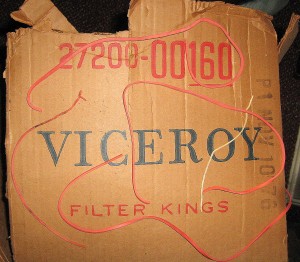 I got insulation flecks on my fleece jacket. It was freezing up there. And there were mouse droppings and desiccated rubber bands.
I got insulation flecks on my fleece jacket. It was freezing up there. And there were mouse droppings and desiccated rubber bands.
My dad used to recycle manila folders. For instance, he would reuse the file “1975 Plumbing” in 1981.
I threw out 30 pounds of paid invoices, checks and rent rolls. I do this every January.
Should I feel nostalgic?
I don’t.
—-
Here’s an op-ed, “From Soltzberg to Stratton,” from last week’s Jerusalem Post (Jan. 17).
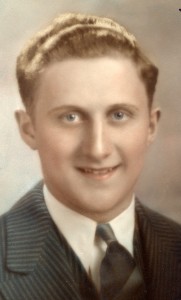
Theodore “Toby” Stratton (ne Soltzberg), 1938, age 21
January 25, 2012 10 Comments
TOSSED OUT
I rented to a commercial photographer who moved out after 23 years and left a store full of manila folders, invoices, developing trays and chemicals. Three dumpsters’ worth. He shouldn’t have done that. I had never hassled him about late fees.
Down the street, the Armed Forces Recruiting Center moved out after 40 years and left a punching bag, three couches, 27 chairs, a lot of “Army of One” promotional material and a 1970s stereo system. That wasn’t the half of it.
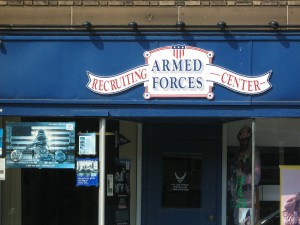 The good news: the government — unlike the photographer — paid for the clean-up. Also, I got $75 for the Armed Forces sign on Craigslist. (I thought the sign would go for more.)
The good news: the government — unlike the photographer — paid for the clean-up. Also, I got $75 for the Armed Forces sign on Craigslist. (I thought the sign would go for more.)
I’m sitting on about 3,000 perfume bottles. I’m not totally sure they are perfume bottles. Martha’s Beauty Salon left the bottles in the basement. The bottles are packed in cartons with zone numbers on them, not zip codes. (Pre-1963.)
Every month I serve an eviction notice on a lawyer. Every single month. Then I file an eviction on him.
The lawyer rents a storefront office. I pay the $85 eviction filing fee and get a court date.
The day before the court hearing, the lawyer pays the rent, including the legal fees. Like clockwork.
Until he doesn’t.
At eviction court he said to me, “I’m broke.” No tears, no dough. “You’re in business. You understand,” he said. “I don’t have the money. I’m moving out.”
He turned in the keys and cleaned the place.
He stole money from his clients. He was disbarred in April and convicted of grand theft in June. Sentencing is next month.
Note to the probation department: he left the store clean.
—-
As my dad used to say . . .
Meaning: Pay the rent. We aren’t a loan company.
August 10, 2011 5 Comments
HE MADE A LIVING AT MUSIC
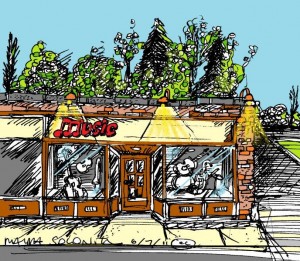
Barry Weinberg, the owner of Mayfield Music in Cleveland Heights, rented PA systems and sold amps, guitars and drums. He died at 55. He was a rocker who lived hard. The sign at the back of his store read Give Me the Dough and You Can Go.
He carried a quality line of blues harps.
Before Barry, Mayfield Music was Chick Chaikin’s store. Chick lived pretty hard too, but in a middle-class way: Chick golfed, raised a family and played thousands of cocktail-piano gigs.
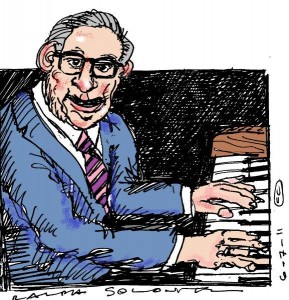
Chick Chaikin
Chick was a big-band leader and solo pianist for decades. He played six nights a week at the Colony Restaurant, and knew just about every pop song written, according to trumpeter Bob Dreifort, who I talked to recently.
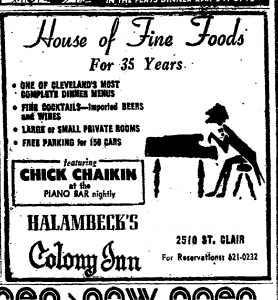
Cleveland Plain Dealer, 8/23/74
Chick’s brother Bill went out to Hollywood and eventually ran a movie studio, Avco Embassy. Bill was involved in The Graduate and more.
“I could have gone to the Coast too,” Chick said. “But my life is here, and I have my work, although every winter I say this is it. But I’m still here.” (Plain Dealer interview, 1977)
Chick’s store was Currier-Chaikin Music. Chick’s business partner, John Currier, was even older than Chick. John Currier had played piano at Euclid Beach Park in the 1920s.
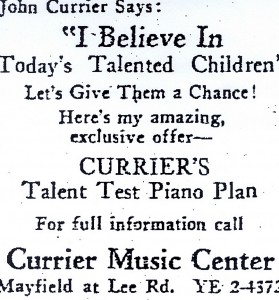
Cleveland Plain Dealer 1/23/53
Chick called me “Toby’s son.” Chick didn’t know my name. Chick and my father, Toby, were Kinsman Road boys.
Most of my father’s friends and acquaintances were businessmen: shoe store owners, insurance men, pawn shop owners.
How did my dad know a full-time musician? I guess Toby had no choice. Toby and Chick grew up almost next door to each other.
How did Chick wind up a full-time musician? I didn’t ask old people questions like that when I was in my twenties.
Chick’s life was all about family and music, his daughter, Jeri, told me this year. For a while Chick had a side job giving private music lessons through Cleveland public schools.I didn’t have the chutzpah to ask Jeri if there was more to Chick’s headstone than Leonard ‘Chick’ Chaikin 1915-2000.
Here are three fitting epitaphs:
a) “Here lies a man who made a living at music.”
b) “Chick a la King.”
c) “I’m here 7 nights a week.”
July 6, 2011 10 Comments
SEARCHING FOR GALICIA
My father, Toby, was a lot like his mother. One of Toby’s mother’s favorite expressions was “Geven-zhe nit a yold.” (Don’t you be a chump.) Toby’s mother owned a candy store, raised four kids almost singlehandedly, buried a three-year-old daughter, and during her retirement years, owned a four-suite apartment building. She was nobody’s sucker.
Anna Soltzberg (née Seiger) occasionally called her grandchildren — like me — foyl (lazy). She lived at our house for a while. I called her Bub — short for bubbe (grandmother). I wasn’t going to call her Bubby. Too effeminate.
Bub was not into baseball; she was into casino (a card game), the television show Queen for a Day; borscht, boiled chicken and cows’ feet. She could eat. She had sugar diabetes. Bub wore bubbe shoes.
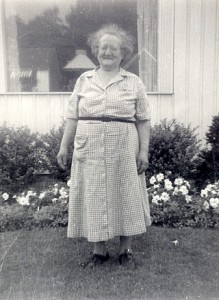
Anna Soltzberg (1884-1964). Circa 1951.
I couldn’t figure out where Bub was from. I couldn’t even find her hometown on a map.
Bub said she was from Galicia, a province in Austria-Hungary. She was from the shtetl (village) of Grodzisko. She came to America at 20.
In junior high I told my friends, “My grandmother is from Austria.” That was dead wrong, but it made sense.
In her old age, Bub lived at my aunt’s house before she moved in with us. At my aunt’s, Bub complained about the level of kashrut (kosher observance). Bub wanted my aunt to not keep kosher. Keeping kosher was too expensive. Bub was an apikoros (non-believer), socialist and cheap.
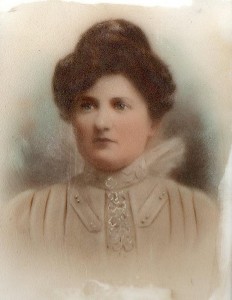
Bub, circa 1904.
At Bub’s funeral — at the shiva (mourning) meal — the question of kashrut came up again. My two aunt Lils (Lil from Delaware and Lil from Washington), plus my Uncle Itchy, were at our dining room table.
Uncle Itchy, sitting next to Delaware Lil, asked, “You keep a kosher house?”
“Yes,” said Delaware Lil.
Itchy, slapping his hand down on the table, said, “Then why are you eating this meat? It’s not kosher!”
Washington Lil, also slapping her hand down, said, “Ain’t that a hypocrite!”
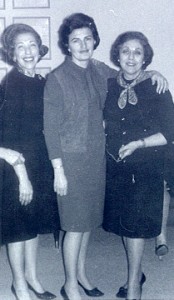
Washington Lil (left), Julia Stratton, Delaware Lil. 1964
“In other words, it’s either everything or nothing?” said Delaware Lil.
“Yes,” said Washington Lil.
“That’s a very simple philosophy,” said Delaware Lil.
“Yes, it is,” said Washington Lil.
My mother, Julia, interrupted with: “Pass the treyf meat.” (Non-kosher meat.) Mild laughter. My mom was the peace-maker.
And the Lils didn’t talk to each other for a long time. Years.
. . . Grodzisko, Galicia, Austria-Hungary. I found it about 20 years later, in the mid-1980s, on the Shtetl Finder map. The village’s Yiddish name was Grodzisk (pronounced GRUD-zhisk), about 60 miles west of Przemysl. The various shtetls (villages) had so many different names. That was the trick. And there were several Grodziskos.
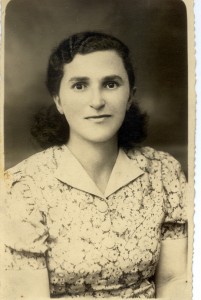
Mili Seiger 1939
During my research, I came across a family postcard, postmarked “May 1, 1939, Grodzisko.” It was from cousin Rachela Seiger. It was in Polish and said, in brief, “How are you?” On the flip side was a photo of Rachela’s sister Mili.
The Germans invaded Poland four months after the postcard was mailed.
I looked up “Mili Seiger” and “Rachela Seiger” on the Yad Vashem (Israeli Holocaust museum) online archives. There were so many Seigers, Siegers, Zygers, Zaygers and Zeigers, I couldn’t find Mili or Rachela.
There are three types of Jews. Not Reform, Conservative and Orthodox. Try American, Israeli and victims of the Holocaust. Each about a third. These are my people.
—-
This story was cross-posted on The Forward, online, last month.
Thanks to Yiddishist Lori Cahan-Simon for help on the expression “Geven-zhe nit a yold.”
Footnote . . . Plotting Grodzisko by Teddy Stratton, 1998:

March 23, 2011 10 Comments
THE JEWISH PING-PONG LEAGUE
1. EAST DIVISION
The ping-pong season started several months ago, when violinist Steve Greenman called and said “I want to play ping-pong tonight.” He got tilapia out of it. Not a bad night for a single guy (soon to be married). My wife, Alice, cooked.
Ping-pong is predominately a winter sport in Cleveland. The Jewish ping-pong dean here is Valeriy Elnatanov. He’s a Russian pro who used to teach ping-pong and pilpul at Green Road Synagogue, an Orthodox shul. [Not sure about pilpul (a Talmudic study method) but he did teach Hebrew to Russians.]
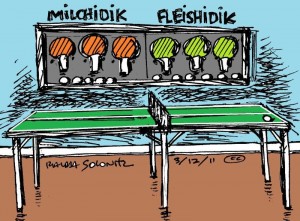
Valeriy moved on to other training facilities. I saw him at the Shaker Heights community building playing top-notch Asians.
Valeriy said the best way to develop a top-spin forehand is to turn a bicycle upside-down and swat repeatedly at the spinning tire with your paddle. I never did that, but I thought about it.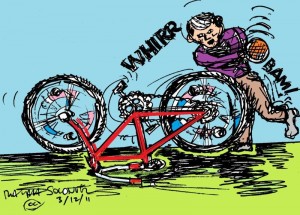
When Valeriy practiced, he used dozens of balls. That’s the way to go. You bend down less.
My wife, Alice, has a good forehand slam. Steve Greenman has a steady backhand. Neither cheats. Many ping-pong players don’t toss the ball up high enough on the serve.
2. WEST DIVISION
How come documentaries about California musicians — Hal Blaine, the Sherman brothers — have poolside shots, but no outdoor ping-pong shots?
I played ping-pong on a patio in Los Angeles. You don’t forget that if you’re from the Midwest.
In the Cal movies, the musicians are sunbathing poolside. Are they embarrassed to show their ping-pong moves? (The Kids Are All Right, set in California, had an outdoor ping-pong table. No musicians playing, though.)
My father, Toby, had a childhood friend in Los Angeles, Irv Drooyan, who taught school, wrote math textbooks and played outdoor ping-pong. Toby kept in touch with Irv and one other Clevelander in California, Sol of San Diego. In the 1950s, California was just an extension of Cleveland.
These friends of my dad occasionally switched their first names — maybe to dodge anti-Semitism. Irv was Red. Sol was Al. Toby was Ted.
My introduction to outdoor ping-pong was on Red Drooyan’s patio in Woodland Hills, California, in 1962. Unforgettable because a) it was outdoors, and b) I didn’t know my dad had any friends. In Cleveland, my father had hung around exclusively with my mom’s friends and their husbands.
California was about a) stippled paddles — with a woody sound, and b) my dad with friends.
Good vibrations. Got to get back there.
To 1962 or California?
To the ping-pong table.
Your serve.
—-
[For goys only. In Ralph Solonitz‘s ping-pong table illustration, “milchidike” refers to dairy and “fleishidike” means meat. The two major divisions in the Kosher League.]
—-
Please see the post below too. It’s raunchy and new.
—-
Yiddishe Cup celebrates Purim this Sat. (March 19), 7:45- 9 p.m., Park Synagogue, Cleveland Heights. Open to all. Free.
March 16, 2011 9 Comments
FIVE UNEASY PIECES
1. My father had a game idea Let’s Blow Up the World. I apportioned the megaton bomb ratings to various countries. What kind of bomb did Paraguay deserve? An M-80 firecracker? Let’s Blow Up the World never made it past “high concept.”

2. Alan Douglass, Yiddishe Cup’s keyboard player, was a klezmer-revival pioneer. He could have called klezmer “anchovy pear music” in Cleveland in the 1980s and people would have believed him.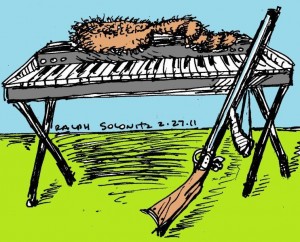 Alan let other musicians start the klez bands. These others musicians got the extra money for being bandleaders. What can a gentile do? It wouldn’t have looked right for a goy — Alan — to lead a klez band.
Alan let other musicians start the klez bands. These others musicians got the extra money for being bandleaders. What can a gentile do? It wouldn’t have looked right for a goy — Alan — to lead a klez band.
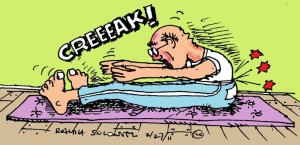 3. Len Gold, a Cleveland ad man, wanted to make a Yiddishe Cup exercise video, Stretch ‘n’ Kvetch, to sell at temple gift shops. Never happened.
3. Len Gold, a Cleveland ad man, wanted to make a Yiddishe Cup exercise video, Stretch ‘n’ Kvetch, to sell at temple gift shops. Never happened.
4. Don Friedman, Yiddishe Cup’s drummer, was on What’s My Line in 1966. Don’s line (job) was testing drums for the Rogers Drum Co. in Cleveland. (He was a drum tester, not a rum tester.) Don probably could have had several more minutes of fame if he had asked Bennett Cerf to explain his name.
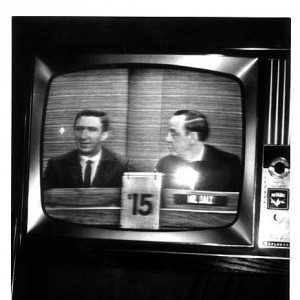
Don Friedman (L) with host John Daly
—
5. Yiddishe Cup had a gig lined up for Fuerth, Germany, but the klezmer festival organizers there changed directors, or something, and we got canned. I heard years later, through the klez grapevine, that Yiddishe Cup will never play Fuerth. “They don’t like you!” That’s the word on K Street.
Why don’t they like us? Maybe because I wrote the festival committee: “For three years we think — with good reason — we will be playing a concert in Germany. Then, boom, it all goes kaput!” I ended with a string of rage: “unscrupulous,” “shameful” and “dirty.” I did not play the race card. I did not call the klez-festival organizers anti-Semites.
March 4, 2011 6 Comments
FISHING FUN
My mother went deep-sea fishing off the coast of Miami Beach and caught a sailfish in 1965. She had the fish mounted, and over the years, the trophy fish moved around like Waldo. It’s in a garage now at my nephew’s in Arizona.

Cleveland Press
When I was young, my family went to Florida just that once. I’m not saying we were deprived. I’m saying I didn’t go to Florida regularly like my wife did!
My wife, Alice, went every single year. Her family stayed at the Deauville. Even Alice’s mother (a small-town Jew from West Virginia) went to Florida annually in her childhood. That was in the 1930s, to a kosher hotel in Miami Beach.
I married into money. Or so I thought. [See the post “Major Roofer.”]
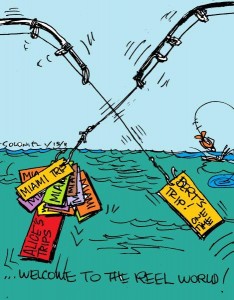
In the mid-1980s, I took my parents’ car and drove from Boca Raton (where my parents had a condo) to Miami Beach, looking for extremely old Jews. The Boca Raton Jews weren’t old enough for me; I wanted to see Isaac Bashevis Singer and similar alter kockers in Collins Avenue cafeterias.
Philip Roth’s father had stayed at the Hotel Singapore. So had Meyer Lansky. Mickey Katz patronized the Delano. (I didn’t see these men. That would have involved time-traveling.)
The Clevelander Hotel at 10th and Ocean Avenue featured a horrible restaurant, Harpoon Mickey’s. I saw plenty old Jews on that trip.
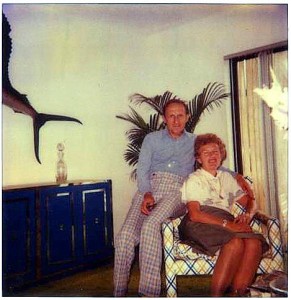
A piece fish, plus Toby and Julia Stratton. Florida, 1983
Last winter I returned to Miami Beach and saw very few old Jews. I saw a lot of jet-setters speaking foreign languages and wearing nearly nothing.
I noticed the Clevelander Hotel was spiffed up; the bedroom floors had a silicon seal to keep the guests’ puke from seeping to the rooms below. The Clevelander was now rocking. I looked for T-shirts in the hotel gift shop and read about the silicon seal in a local newspaper article.
At the Fontainebleau Hotel, Max Weinberg’s swing band was playing in the lobby. The horn players — studio musicians from California — were wailing. What a treat, and it was free.
I phoned the cultural arts director at the Boca Raton JCC. She was on vacation. I wondered, Where does a Miamian go for winter vacation? I left a voice mail: “Yiddishe Cup wants to play in Boca again!”
Success. We landed the Boca fish. Yiddishe Cup plays the Boca Raton JCC this Sun. (Jan 23), 3 p.m.
—-
Please see the post below too. It’s fresh fish.
January 19, 2011 4 Comments
TRAVELING VIOLATIONS
1. JERUSALEM
Yiddishe Cup’s dance leader, Daniel Ducoff, flies frequently for his day job as university fundraiser. He knows which security lines are fastest. Even if he’s flying Continental, he’ll often switch to the quicker Southwest line at Cleveland airport.
Man against the machine . . .
My Uncle Al griped about tour bus drivers in Israel who turned the air conditioning too high.
My parents had travel stories about drunken Russians on cruise ships. And I heard about haggling for a gold wine bottle in Italy. I saw the slides.
I threw out the slides. I have one left: my parents at The Wall in Jerusalem. My dad had on Jack Purcells. He was always in a hurry.
My dad kept a list of his purchases abroad. Here it is, abbreviated:
Rosewood carving of temple dog. Bangkok
Ceramic bells. Israel
Porcelain-in-pewter bowl. Hong Kong
Brass circular dish. Morocco
Wool flokati rug. Athens
My parents didn’t buy all that much. No jewelry and not much clothes. My dad left me plenty, but very little clothing. I’m not complaining. I got buildings.
***
2. KENTUCKY
Daniel Ducoff — Yiddishe Cup’s Sir Dance-a-lot — collects refrigerator magnets of states Yiddishe Cup has played. Sometimes I give Daniel magnet investment advice. For instance, 10 years ago I told him to buy “Kentucky.”
It was getting on my nerves — not playing Kentucky. Kentucky is ridiculously, abuttingly close, to Ohio.
The conductor of the Cleveland Pops Orchestra has played in 10 foreign countries and 29 states. Who’s counting.
Next month Yiddishe Cup plays Connecticut — a state which isn’t even on our screen. Is Connecticut a legitimate state? Does it have a state bird? Connecticut seems more a township or shire than a state.
Yiddishe Cup has played Ohio, Indiana, New York, Texas, Illinois, Missouri, Wisconsin, Georgia, Virginia, North Carolina, West Virginia, Michigan, Pennsylvania, Kansas, Iowa, Nebraska, Florida, Canada and, shortly, Connecticut.
Connecticut but no Kentucky. Why?
Yiddishe Cup plays in Lakeville, Conn., on 10/10/10 for a wedding. Klezmer bandleaders from the Northeast will not be happy to read this.
Or maybe they won’t care. Maybe they’ll all be in Kentucky that day.
***
3. NORTH CAROLINA HAIKU
The Greensboro Furniture Mart
convention
is happening.
No beds except at the seedy hotel
across from the Executive Club
which in Cleveland is a catering hall
but in NC is a strip joint
Are we in Amsterdam?
Continental breakfast
The Corn Flakes in the Styrofoam bowl
need milk
for weight
fast
Too late
Where’s the broom?
Musicians with instruments
at the Delta counter
“Our gig was colder than an MF,” their drummer says
“You played outside?” our singer says
The Neville Brothers’ drummer
Even the big boys freeze their pupiks.
—-
1 of 2 posts for 9/29/10. Please see the post below too.
September 29, 2010 4 Comments
LOCATION, LOCATION, LOCA. . .
1. PITTSBURGH
Pittsburgh is where terrific walk-on musicians play with Yiddishe Cup. We had a Duquesne University guitar teacher, Kenny Karsh, sit in at wedding. How many jazz musicians know “Yossel, Yossel” and “Chusen Kale Mazel Tov”? He did.
At another Pittsburgh gig, the bride’s uncle sang. He requested the key of Ab. Nobody but a pro asks for Ab. He sang “Unchained Melody,” a slow song, even though the bride had emailed “NO SLOW SONGS.” But what could she do, the singer was her uncle. He was a hit. (Brides don’t know what they want.) He was in a Chicago society band.
Pittsburgh’s JCC has an outdoor clock with Hebrew letters on it. Pittsburghers rebuilt their JCC in Squirrel Hill, where it had previously been. In Cleveland, no Jewish institution would rebuild in the same place. Twenty-five years and out. That’s the rule in Cleveland. Move it.
When the Cleveland Heights JCC moved to Beachwood in 1985, my dad, Toby, bought a plaque for the new cloakroom. The plaque, which was no bigger than a business envelope, cost several thousand dollars.
Nobody noticed the plaque.
Several years later, the Beachwood JCC expanded, and Toby’s cloakroom was in the heart of the action, right next to the new auditorium.
My dad could always pick property.
Except in New Mexico. That was out of Toby’s wheelhouse. Toby foundered whenever he left Ohio. He bought a piece of land near Albuquerque that went nowhere.
He also did a deal on a shopping strip center in Sunrise, Fla., and lost money because he wouldn’t — or didn’t know how to — play ball with the crooked city administrators.
A relative, Lefty, sold my father the New Mexico land in 1965. Lefty was a Jew with a tattoo. Lefty lost a lot of money for a lot of people.
Toby didn’t hold the deal against Lefty. The land is still there. It’s not going anywhere.
I saw Lefty at gigs over the years. He didn’t go by Lefty any more. He got into basement waterproofing business and made a lot of money.
Forget the Land of Enchantment . . .
Pittsburgh. Pittsburgh is Yiddishe Cup’s San Francisco — hilly, terrific neighborhoods, great museums and a lot of culture. “I Left My Heart in Pittsburgh.” Write it.
***
2. BOLLYWOOD
Something important happens at weddings, unlike at bar mitzvah parties, where you’re just attending a family reunion. Pass the family reunion T-shirts.
The ultimate low-stress gig: a 50th wedding anniversary party. Play whatever you want. Everybody is glad to be there, period.
For weddings, the bandleader sometimes gets mounds of emails and communiqués beforehand. The bride doesn’t want the band to play anything slow, nothing from Broadway, and she wants to hear her Bollywood MP3s at break. Also, don’t announce the newlyweds’ names, but if you must, say “Jen and Zach.”
“I’m NOT taking his last name!!” the bride emails.
Not every bride is hands-on, though. Some say, “We know Yiddishe Cup has done this many, many times. You know what works. We trust you.” These are the best brides.
Here’s what works: skipping the Bollywood music, strolling table-to-table, varying the musical styles and inviting guests to sit in with the band. Toasts work too — in chunks. No more than three toasts in a row.
And having the wedding in Pittsburgh. Preferably at the downtown Westin. The staff there feeds Yiddishe Cup before the guests. Maybe because we’re important out-of-town musicians.
—-
Yiddishe Cup plays 7 p.m. Wed., Sept 29, Fairmount Temple, and 7:15 p.m. Thurs, Sept. 30, Park Synagogue, for Simchat Torah. Cleveland.
September 15, 2010 5 Comments
TED “SKI”
Ted Budzowski was my dad’s favorite building manager. Maybe because they were both Teds.
My dad was “Ted” at work and “Toby” at home. Ted Budzowski was “Ski” at his day job (crane operator at Republic Steel) and “Ted” around the building.
Ted Budzowski could have treated me like a silver-spoon son of a boss, but instead he invited me down to the mill on family day. I didn’t make it to the mill for some reason. Everything was air-conditioned at the mill now, Ted said, including his crane cab.
I eventually caught a tour of the mill with the Society for Industrial Archeology. The slabs of molten steel coming from the furnace looked like creamsicles. Big red melting blocks.
My dad and Ted talked in a clipped cadence, like telegrams. Ted would say, “The kid [tenant] is hanging on by the grace of God.” That meant pay up.
“That tenant is a troublemaker,” my dad answered.
“The kid better not raise a rumpus.”
“He’s thinks he’s cute.” Toby said.
“Yeah, tell it to the judge,” Ted said.
“Give him an eviction notice.”
Ted had two Stratoloungers in his living room, an Okinawan mongoose-and- cobra souvenir, and a tree-stump occasional table, which his son had made. The son lost $8,000 on tree stump tables, which never caught on big in Cleveland. The good news was the son also was a retired career solider.
Toby and Ted were about the same age. Toby was from Kinsman Road, and Ted had grown up in Youngstown, Ohio, near Cowshit Hill (a real place). Ted’s kids had made it out, just like Toby’s. Ted’s second son worked for the phone company.
When Ted retired to Texas to live near his military son, I hired Buck, a hard case who had grown up in a Tennessee orphanage. Buck didn’t like certain people, particularly sons of bosses. Buck thought many routine tasks — cleaning up after tradesmen, watering outdoor plants — were not part of the job.
Buck frequently got “porky” with me. (That was West Side talk for “argumentative.”) Ted, on the other hand, had always been helpful. Ted would tell me when my tire pressure was low. He could sense low tire pressure. He thought about tire pressure.
For his last 15 years, Ted’s HQ was probably his Stratolounger in San Antonio. He didn’t check back with me, except for an annual holiday card.
Meanwhile, Buck was raising prices unilaterally on odd jobs. He never asked what I thought the job was worth. Who was bossing whom?
I had a hard time bossing around people older than myself.
That changed. I got older.
—-
1 of 2 posts for 8/25/10. Please see the post below too.
August 25, 2010 4 Comments
STANDING IN THE SHADOW OF LeBRON
1. GOT A CARD? NO!
I was a guest at a wedding where the band’s sign was bigger than LeBron James. The banner was eight-foot, like something you might see on a telephone pole announcing “125 years of excellence in education.”
The wedding reception was elegant, but the band’s sign was totally Bedford Auto Mile. The sign read “More Acts, Better Music, Higher Standards.”
Higher Standards? The bandleader was Italian. I knew him. Roman standard bearers? The bandleader said to me, “It’s better to be a guest than to work, huh?”
What? I always prefer playing over schmoozing.
When Yiddishe Cup does weddings, I hand out business cards. Nothing gaudy. And I don’t shovel them out. These cards are almost collectors’ items. I’m not going to pass them out willy-nilly.
Everybody already knows Yiddishe Cup. If you say “klezmer band” in Ohio, it’s us. Now, if we’re in Buffalo, N.Y., for example, I might go heavier on cards. But I don’t put out a tray. That’s too dental office.
Granted, we feature Yiddishe Cup’s logo on our bass drum. Our logo is cool, whimsical and tasteful, and it gets us some gigs. (Ralph Solonitz designed the logo.)
At the “Higher Standards” wedding, I met a businessman who did music production as a sideline. I asked for his card. He didn’t have one. And he had 100 employees, he said.
He had achieved placid-plus status: no card.
My goal is to be him.
***
2. BALLISTIC / LOADING / CAVS
A Yiddishe Cup musician went ballistic when he saw a college football game, or so he thought, off in the distance. He said, “I’m so through with this country’s obsessions with sports!”
Yiddishe Cup was loading-in at a student union by a college stadium.
The Yiddishe Cup musician had fouled. Here’s why: (1.) The college kids were playing lacrosse, not football. (2.) It was a Division III game. The stadium was small, with no crowd to speak of. (3.) The kids were getting some exercise; this was not a big money, faux-pro game.
Yiddishe Cup musicians, for the most part, are not up on today’s sports scene. For instance, I just learned a basketball shot “from downtown” means a three-pointer. And I’m wondering what “the post” is. I watched several basketball games lately.
I have an agreement with my cousin George, a serious sports fan, to go to the Cavs victory parade. I want to be there. Depends on my Depends though, because I’ll be very old. Also, depends if it’s raining. I’m fair weather.
Last Sunday Yiddishe Cup had a gig, a pre-Shavuot Torah dedication/celebration, which was almost postponed to accommodate LeBron James’ reading of the Book of Kells. The Cavs were scheduled to play the Celtics then. (Cleveland lost prior, on Thursday, so the playoff series ended, and everything worked out fine for the Torah dedication.)
About championships . . . My father, Toby, promised to take me to the World Series, but the Tribe never made it when I was growing up. My dad, instead, took me to Ohio State homecoming games.
I took my kids to the 1992 OSU homecoming game. The Ohio Stadium scoreboard lit up: This Sat. at the Wexner Center, Don Byron Salutes Mickey Katz.
What next, Bucks? “Fight the Team Across the Field” in Yiddish?
Don Byron played OSU, I think, because Columbus resident Les Wexner, the billionaire owner of The Limited, paid Byron’s band to entertain Wexner’s elderly mother, who probably requested the Mickey Katz show because she didn’t want to fly to New York. That’s the only logical explanation. Don Byron never played any other Mickey Katz–tribute shows in Ohio.
Go Mickey.
Go Katz.
Go ‘Cats.
Go Cavs.
If you’re a Cubs fan, or whatever, be quiet about your sports-induced suffering. You don’t know anything.
May 19, 2010 3 Comments
MICE ARE GOOD PEOPLE
My father, Toby, owned a modern “apartment community.” The complex was “garden-style,” meaning three-story buildings grouped around a parking lot and pool. The buildings had mansard roofs and looked like McDonald’s. The place had an Anglo name. Jamestown. Should have been Jonestown.
The development looked genteel but wasn’t. One guy peed in the heating ducts and poured aquarium gravel in the toilet on his way out. Some tenants used the hollow-core doors for karate practice.
A high school wrestling coach, who was also a multi-millionaire, bought the complex and turned it into condos in 1977. Worked out for everybody. As the banker said to Toby, “You made your money, and he made his. Be happy.”
I used to repair the complex’s roofs, mostly replacing lids on vents. The lids were called Jap caps because of their coolie-hat shape.
There is no more peaceful place than a roof top — at least a flat roof. You can see everybody, and nobody can see you. That’s why cops in The Wire go on roofs so often.
***
“I’m in real estate.”
I say that whenever I don’t feel like saying “I’m a landlord.” If I say “I’m a landlord,” people often hear “I’m a slumlord.”
I don’t sell houses or flip properties. I collect rent, evict people, charge late fees, and look for cats in apartment windows so I can charge pet fees. Does that sound like a slumlord?
When I vacationed at the Michigan alumni family camp, I introduced myself at the meet-and-greet as a landlord and klezmer musician. People laughed at the “landlord” part, particularly the campers with advanced degrees. “Landlord” was so bad it was good. “Klezmer” was cool — the arts.
I came across a Yiddish anti-landlord song in the klezmer business. “Dire Gelt” (Rent). The lyrics, in brief, are: “Why should we pay rent when the stove is broken?”
I’ve heard that line before about the broken stove. Not often. It’s usually “My bathroom ceiling is falling in.” It’s all about water damage in the landlord biz.
And it’s occasionally about animals.
What bugs me: tenants who ask for a hotel room because they saw a mouse.
Mice are good people. I’ve had mice in my house. I don’t run to a hotel every time I see a mouse, and my bank doesn’t give me a reduction on my mortgage payment.
—
1 of 2 posts for 4/21/10. Please see the next post too.
April 21, 2010 3 Comments
THE LIFE CYCLE DIARIES
1. CHEERS FOR “L’CHAIM”
I had a funeral gig, or thought I did. The deceased, Sid Elsner, had booked me years prior. Sid wanted a New Orleans-style, jazz-klezmer element at his funeral. Not a kosher concept, but neither was Sid. [Goys: Jews don’t often have music at funerals.]
When Sid died, none of his adult children mentioned music, so I didn’t play.
At the gravesite, I got a recipe for Sid’s brisket. His oldest son was passing out the secret list of ingredients (chili sauce, onions).
Food works. That’s why there are shiva (mourning) meals.
A musician in Yiddishe Cup has attended only one funeral. He has been to hundreds of weddings and one funeral. Lucky.
My mother’s favorite song was “Shenandoah,” which we sang it at her stone setting but not at her funeral.
My dad didn’t have a favorite tune.
Yiddishe Cup’s singer, Irwin Weinberger, wants Yiddishe Cup to play at his funeral. I hope I can oblige.
After a 2000 Yiddishe Cup gig, I stopped at my father’s grave with my youngest son, who placed an old clarinet reed on my dad’s headstone. My son had just played his first paying gig, on drums, with Yiddishe Cup. I wanted to let my father know I was still around, still pushing the ball — cutting the grass, raising a family, starting a klezmer dynasty. That last notion — the klezmer dynasty — would have flummoxed Toby, my father. The last time Toby had heard me play I was a Cannonball Adderley wannabe.
. . . Here’s some advice for Jewish dads doing toasts at weddings: make your speech funereal. Pretend you’re updating your dead father, even if he’s alive. Use flashbacks and talk about your kid’s personality quirks. Stay on the high road; let the maid of honor do the weird stuff. And end with “L’chaim,” even if you’ve never said it before. “Cheers” from a Jew is a big turn off.
***
2. TOWER OF POWER
It’s unnerving when the bride ditches her own wedding. She gets the flu for example, or a headache or swollen ankle, and has to lie down for a few hours. Misses the whole party. That marriage may not last.
Worse: the mom dies during the “Chicken Dance.” That happened. Not at my gig, but at one my video guy was at.
Did my video guy get it on tape? I don’t know. The video guy died on me. Not at my gig, but slowly, over months.
He didn’t move around much; he had a stationary video rack. He just stood by his rack, which I called the Tower of Power, and barely budged the whole night. In his final days, he really bugged me. For instance, when Yiddishe Cup would stroll table-to-table taking requests, like klezmer-achis, he would tell me which tables to go to. “Can you do the head table next?” he would ask.
I didn’t know he was that sick. “Why?” I said.
“Because I want to sit down,” he said.
I said no. The head table was nowhere near us. We had a traffic pattern to maintain.
He said, “I’ll remember this when you want a favor.”
Then he died.
—
Yiddishe Cup plays Mon. April 19, 6:35 p.m., for the community-wide Yom Ha’atzmaut (Israel Independence Day) celebration at B’nai Jeshurun Cong., Cleveland.
April 14, 2010 6 Comments
CLUBBING
Nobody in my neighborhood knew about private tennis lessons. Music lessons, yes. Tennis, no.
Exception: my father, Toby. When I was in high school, Toby got me about 10 tennis lessons at a gentile country club, and suddenly I was one of the best players on my high school team. Yes, we still got clobbered by Shaker Heights and University School, but in our division, the Lake Erie League, we were above average.
That goyish club now will accept anybody, and not just for drop-in tennis lessons. Show them the money.
One of my mega-rich buddies says two Cleveland country clubs still don’t want Jews. Yiddishe Cup plays those clubs. Well, once. We got treated fine there. The upper crust treats help and dogs best.
We get hassled the most at a Jewish club: “Use the kitchen door,” says Kim the Kurva (Whore), the manager. Kim (not her real name) doesn’t want musicians near her front door, messing up the view or her valet parking.
Kim’s view might disappear soon. That Jewish club is considering closing and merging with a nearby gentile club.
“Hine Ma Tov” (How Good It is) at the Mistletoe Dance. Yiddishe Cup on the bandstand. We’re ready.
—-
2 of 2 posts for 11/11/09.
November 11, 2009 No Comments
OLD GUYS
The phone number at AAA Window Shade Co. was 221-3700. The proprietor, Joe Villoni, started there at 13, and was 87 when he pulled the last shade down. Seventy-four years: same job, same location.
He quit in 2003 because nobody was buying window shades anymore. Everybody was into $5 mini-blinds at Home Depot. My father,Toby, and I had kept Joe’s rent low because Joe never asked for anything.
The store’s wood floor had a grooved path circumnavigating the huge window shade—making machine. That apparatus, and possibly the whole store, belonged in the Henry Ford Museum.
I always liked Joe — and the other old-guy tenants. I was just a baby, a pisher (pisser/youngster), to these guys. Another old tenant, Jim English, gave me a metal Phillies cigar box full of screws. I appreciated the cigar box more than the screws. I was in my twenties and collected anything older than myself.
An old custodian, Jeanne Saunders, left me several novel manuscripts when she died. She had one lung, a great disposition, and a tough life; she should have written her life story and gone easier on the long, lanky cowboys and gladiators.
Another old custodian, Mary Kubichar, produced a concert for Yiddishe Cup. It was at the Beck Center for the Performing Arts on the West Side. That was the first — and last — West Side Yiddishe Cup concert. (West Side means “not a lot of Jews.”)
Mary was from western P.A. (You need to say each letter: P. A.) She never married. After retiring from Higbee’s department store, she became a super volunteer at her church and the Beck arts center. So when she told the arts center to hire Yiddishe Cup, they owed her. The concert turned into an appreciation party for Mary. (She died the next year.) Even the publisher of the Cleveland Plain Dealer showed up. It was a very big deal. We played a couple Slovak pieces for Mary.
—-
1 of 2 posts for 10/28/09. Please see post below too.
October 28, 2009 4 Comments
FISHY
1. JEWISH FORK-LORE
Musician Mickey Katz called chocolate phosphates “Jew beers.” He drank them at Solomon’s on E. 105th Street.
I drank mine at Solomon’s at the Cedar Center shopping strip, where Solomon’s moved to.
For some Semitic semantic reason, goys occasionally called Cedar Center the Gaza Strip. Now it kind of is. The north side of Cedar Center is concrete chunks and gravel heaps. A real estate developer knocked down the 1950s-era plaza and plans to redevelop. Who knows when.
Solomon’s was my family’s deli of choice. My father, Toby, was a “deli Jew.” In the Jewish world, that’s usually a putdown, meaning the person knows more about corned beef than Rashi. Toby’s favorite food was a “good piece of rye bread.”
Toby, a phosphate fan, probably didn’t drink more than a dozen real beers his whole life. He should have. In his retirement, when he drank booze he smiled a lot more. A bit shiker at one party, Toby teed off on a watermelon fruit bowl with a golf club. That stuck with me. [Shiker is drunk.]
Toby grew up in a deli. His mother had a candy store/ deli at E. 118 Street and Kinsman Road. She sold it to her half-brother when he came over from the Old Country. Something fishy about that deal — something involving the half-brother’s wife. My grandmother went from candy store/deli owner to simply candy store owner. Not a lateral move.
At the Gaza Strip, there was also Corky & Lenny’s. (Still around — four miles east.) A couple small Jews hung out in the rear booth at Corky’s. One was Harvey, who did collections for a major landlord. (Major, to me, means more than 1,000 units.) I knew Harvey from junior high.
He sued my mother. My mother, for health reasons, moved from her Beachwood apartment after 27 years into an assisted living facility. She had a couple months left on her lease. Harvey, who represented the major landlord, went after her. Harvey’s boss, by the way, loved my band. So what. My mother was collectable.
Freelance journalist David Sax just wrotea book about the decline of delis. Here’s something for the second edition, David: Delis went downhill when they added TVs. Now you have to watch the Browns while you eat.
I was deli-famous. At Jack’s Delion Green Road, I had a thank-you note up in the entrance. My letter was about the terrific tray for my firstborn’s bris. Fatherhood was about buying huge quantities of smoked fish. What a blast. (I ordered the exact same tray for my daughter’s naming.)
I complimented Jack’s Deli on its fish, which my Aunt Bernice, The Maven, also liked. I mentioned “The Maven’s seal of approval” in my letter. Bernice work for a food broker and knew food.
My letter was up for a couple years.
—
(Acknowledgment to Henry Sapoznik for “fork-lore” in this story’s title.)
***
2. ’DINES
The trend at mass-feed kiddushes (post-service temple chows) is toward Israeli foods: hummus, baba ganoush, Israeli salad.
When you privatize — and don’t invite the whole congregation — you typically add some fish.
All Jews like a good piece of fish: lox, smoked fish, herring, the occasional sardine.
My youngest son recently called from Trader Joe’s in Ann Arbor, Mich., and said, “Don’t get excited, Dad, but do I want the sardines in oil or water?”
“Oil.”
I did get excited. My college kid was finally getting into ’dines.
My mother had given me about eight cans of ’dines when I went off to college. I ate them on Sunday evenings, when the dorm cafeteria was closed. (This was back when sardine cans opened with a key, and the ’dines were Portuguese — not Moroccan like now.) Surprisingly – to me at least – the guys in the dorm wouldn’t share my ’dines. Pizza time.
I liked all kinds of ’dines. Even the monster-size sardines in tomato sauce were OK. Bones, no bones . . . no matter. Cajun sauce, soya oil, olive oil, mustard sauce . . . all good. Four ’dines in a can, two in a can . . . either way.
Anchovies? Also, an excellent choice. Make sure you buy your anchovies in a bottle; they last longer than in cans.
Herring in wine sauce. Beware. Last month Heinen’s supermarket substituted Vita brand for Golden Herring. That was lamentable. Vita is too sugary.
At luncheons, the other Yiddishe Cup musicians don’t seem to appreciate the fish (i.e., the “dairy spread” in kosher parlance) as much as I do. Yes, they like the lox. Lox is apple pie. But the other items (smoked fish excluded) get little play from the band. You should see the mountains of herring left over.
October 21, 2009 17 Comments

